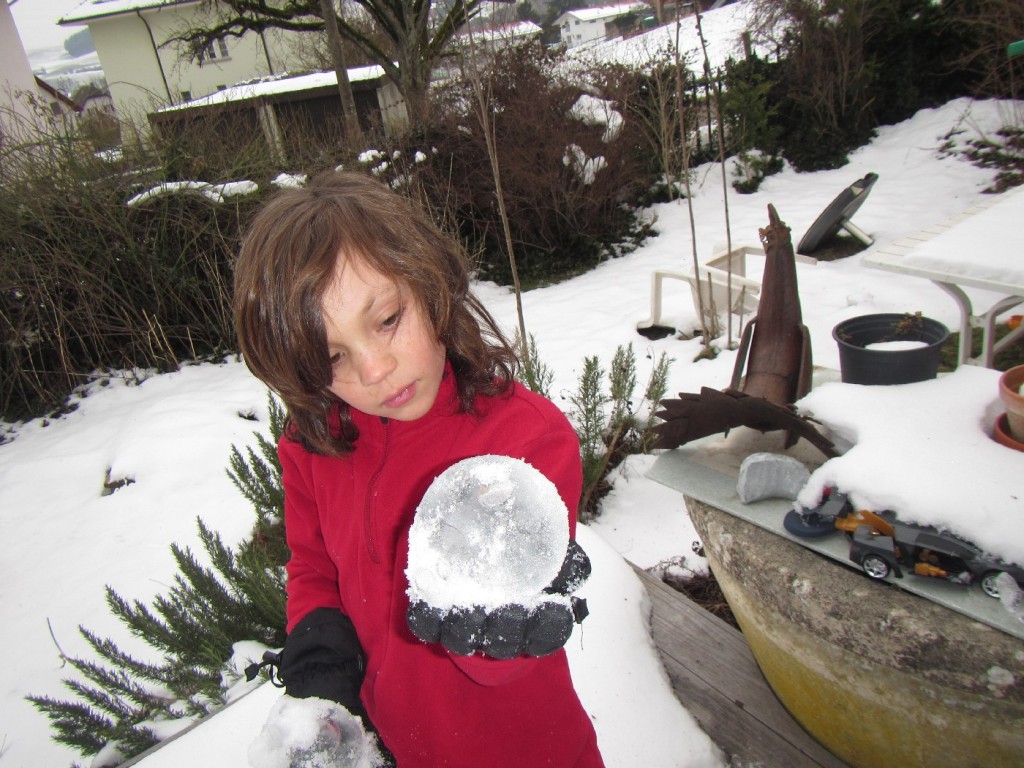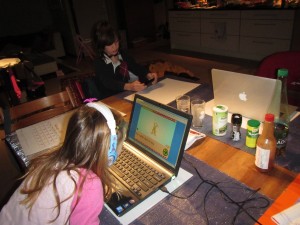
Science experiment: which solutions will freeze into ice balls?
I discovered that homeschooling, like most endeavors, is best learned by doing. You can prepare—just as you might for childbirth—but in the end, shit happens and you have to be willing to go with the flow. The trick is to trust that in the end, your kids will come out all right; they will learn, one way or another.
Unfortunately, I am far too controlling to trust that, but I’m learning.
Before we left the U.S. for our grand two-year trip around the world, I did as much research into homeschooling our kids, ages nine and three, as I could. At minimum, I had to learn enough to know what to do, or more specifically, what I would do. I needed to have some structure or goals in place.
My husband Pierre, on the other hand, planned to “wing it.” No books, no research, no pre-conceived plans. Just learning from the world around us as we lived our daily lives. Yeah, right, I thought. Back to my research.
Preparing to Homeschool
There is a deluge of information out there on homeschooling. In the end, I watched just a few inspiring videos (everyone must see one of Sir Ken Robinson’s TED talks), read just one book (The First Year of Homeschooling Your Child by Linda Dobson, an excellent primer), and limited myself mostly to one very resourceful website (a2zhomeschooling.com). That’s all I had time for, but it turned out to be enough.
From these resources, I learned there are many different homeschooling methods and also ways in which kids learned. You don’t have to bring the classroom into your home; far from it! This was great news, as our nine-year-old son Julien does not do well in the traditional public school setting. I could now imagine him interviewing artists or scientists on their work or creating video blogs about our adventures. The possibilities excited me.
From there, we decided “unschooling” or child-directed learning would work best for us, but in a structured, guided way, especially given that our son learns best by moving around and experiencing things. I followed that with putting together our educational philosophy, as the book had recommended, as well as the subjects we planned to cover, using the legal requirements for our home-based state of California as a template.
That’s as far as I got. We were too busy closing down our house to design actual lesson plans. It would have to wait until we arrived at our first destination: my husband’s home, Switzerland.
(Side note: I should also point out that I didn’t bother with curriculum or purchasing workbooks. First, both the book and multiple websites warned not to waste money on them. Also, with just a little sleuthing, I found numerous educational resources on the Internet, from math worksheets to interactive educational programs, for either free or at very little cost. Because we were travelling light, we needed to get our information through our iPads and computers, which suited Julien’s learning style much better anyway.)
Homeschooling by the Seat of Our Pants
The first two weeks of our trip, I homeschooled ad-hoc, which made me uncomfortable. I looked at the course plans and just made up lessons on the fly that would cover the basics. I put Julien on a diet of computer math, encouraged him to read to his sister, and had him do one writing assignment per week. Because the physical act of writing is difficult for him, he hates it. I told him he can write postcards, letters to his friends, it didn’t matter. Just write.
The first week went great! Both kids were enthusiastic. Lily, our three-year-old, read the calendar each morning, traced her name, and then spent hours learning her letters on Starfall, a fabulous program. Julien did his computer math, wrote a letter to his best friend, went through the multiplication flash cards and read books to his sister. Fantastic!
The second week, did not go so well. Julien didn’t want to learn his math facts and balked at the idea of doing a math worksheet.
“You know I don’t like math, Mom,” he said.
Or reading or writing, I thought. I panicked: how can I motivate him?
I had to be careful not to push him or have him feel pressured. My job was to inspire him to love learning, now that he could finally do it his way.
Knowing he likes to work on computers, I spent hours looking into online educational programs, most of which his previous elementary school suggested to me before we left. I found a few to replace the math worksheets and flash cards, and that has made all the difference.
I also made a point to read to him, as a way to ignite his own interest in reading. I thought, and others told me, that if he was truly interested in a book, he would push himself to read. I read A Wrinkle in Time and he loved it, picking up my iPad to read it himself when I took breaks. Just the reaction I wanted!
A week later, a friend left a copy of Diary of a Wimpy Kid: Roderick Rules at our house. Because Julien had seen the movie, he was curious about the book and devoured it on his own, reading all 217 pages in one week without any prodding from us. This I considered a miracle.
He also started some activities unprompted, such as writing a Pokemon book, stapled in the middle and with illustrations, and creating detailed plans for a video game about soccer. I just needed to give him the space to do it.
Julien has loved the field trips too: to Gruyere, the United Nations and the Red Cross Museum, always writing a report on them afterwards, as required and without complaint.
He also discovered chess and was speaking French every day, now.
We Need More Structure!
Nevertheless, I yearned for more structure in our lessons. I also wanted to be sure Julien got a sufficient foundation of subjects each week. In addition to math, reading, writing and P.E. (sports), I wanted him to do some social studies, sneak in some science, maybe study a little art or music.
At this point, Pierre, who had devoted his first few weeks in Switzerland to caring for his terminally ill mother, stepped in with a brilliant idea. He put together a spreadsheet that listed all the subjects in a column on the left and all the days of the week across the top. We would mark what Julien did, and then, in true unschooling fashion, Julien could pick what he wanted to do in the following days and weeks.
“That way, if he hasn’t touched a subject for a while, we can encourage him to do that,” Pierre explained.
I loved it; this was the structure I had been looking for! I optimized the spreadsheet and added weekly goals.
Structure in Action (Or Inaction)
At the end of the first week of unleashing the spreadsheet (officially our third week of school), I was dismayed to see that Julien had not met some of the goals. I wanted him to pick up the slack the following week.
Pierre had a different take. “So what,” he said. “Let it go.”
The week we started the spreadsheet was the week Julien had picked up a book on his own and read the whole thing, which we both agreed was a phenomenon.
“It’s OK to let him slide in other areas, while he pursues a passion,” Pierre said.
How could I argue with that? Maybe it’s my own traditional schooling background, but I still wanted to push Julien back into meeting those weekly goals. Here we were into our third week of homeschooling and I was worried that Julien might “fall behind.”
So Pierre and I went back and forth on the merit of setting weekly goals. Pierre’s main point: setting goals is fine, as long as we are flexible to let them go when the situation requires.
I argued that while it’s good for our son to work in areas that turned him on, he still needed a solid educational foundation to make him well-rounded.
Yes, Pierre agreed, but not week by week, more like month by month, or even within the year.
At this point, I had to remind myself of the conversation I had with a friend of a friend before I left the U.S. Terri and her husband Nigel had travelled the world on a boat with their two kids for a number of years. Terri advised me: “Throw out the books on homeschooling, the curriculum, all of it, and just truly “be” wherever you are in the world. Your kids will learn so much from your experiences.”
When they went snorkeling, she said by way of example, they took out a chart and studied the fish. She also read a lot to her kids, mostly advanced books like Lord of the Rings, and Nigel, who is a writer, had their kids write about their experiences for local newspapers wherever they were. Today, both of their children attend top U.S. universities.
Terri and Nigel also shared a story of spending time with another boat-cruising family and their two kids. “There was no homeschooling, as far as we could see,” said Nigel about these friends. “Their kids just enjoyed being on the boat.”
He went on to say that when it came time for high school, the kids wanted to return to the classroom and did all the reading and learning they needed to get them there.
“When they [the kids] are motivated to learn something, they will do it on their own, and much faster than if we pushed them to do it.” Those two kids, he reported, both earned scholarships to universities.
So Pierre is right, I do need to relax more. And I am also right, to expose Julien to a variety of subjects and learning opportunities as best we can. How else will Julien find his passions? And all the while, we need to let Julien truly “be” wherever we are; because that really does provide the best education of all.
The Results Are Out
Eight weeks into homeschooling now, and Julien is thriving. In addition to getting his academic lessons, he now speaks better French than I do. He’s learned the Swiss ways of respecting the environment and recycling everything, and will even go on hikes (a Swiss national pastime) without complaining. He’s expert at eating fondue, and he proudly goes to the grocery store across the street by himself to buy milk and eggs (we would never let him do that in the U.S.). He’s learned to use our GPS to help navigate us to new destinations, and plays chess and Uno and practices soccer. He plays elaborate, imaginative games with his sister and helps her learn the months of the year. He knows the proper way to greet people in Switzerland (three kisses on alternative cheeks), and he’s learning to exchange dollars for Swiss francs for British pounds for Euros, and what all the different money pieces mean.
Meanwhile, his sister knows her alphabet sounds and is starting to read simple, three-letter words.
I’m starting to trust that all will be OK, that not only will Julien come out all right, he will likely come out ahead of his peers in so many important ways. He’s having an adventure of a lifetime, and he’s truly enjoying the learning.


Yes, homeschooling is a lot of learning, and not only for the kids. So far they love it, and it looks like they like it more and more.
I came to your blog to see if you have some write ups on homeschooling and about your experience. And am so glad and impressed to have found this. Loved reading it. Pierre’s response is typical father like : relaxed, you make it sound funny, but he makes sense at the end of the day. Will definitely go through all of the homeschooling info. Thanks. Keep posting.
Thanks so much, Tina. Glad you found it useful. I will try to give this site more attention! All the best to you!